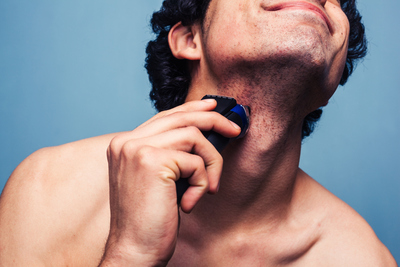How to Treat Ingrown Facial Hairs (Pseudofolliculitis)
by Jarrett Kaczmarski

Pseudofolliculitis or ‚Äúrazor bumps‚ÄĚ is a very common skin condition seen in our dermatology clinic. ¬†Individuals with curly and/or coarse hair are commonly affected and it occurs when the sharped pointed ends of shaved hairs grow back into or under the skin surface. ¬†In men, the beard area is commonly affected; in women, the bikini area is most commonly affected.
The sure way to avoid this condition is not to shave at all Рfor many, this may not be a realistic option.  The good thing is that there are things you can do to diminish the severity of these attacks.
If letting your hair grow is not an option, I would recommend using an electric shaver to avoid close shaves.  Here are some additional tips to ensure you are doing everything you can to minimize a case of pseudofolliculitis:
- If your preference is a disposable razor, lather and rinse the area to be shaved with a 2.5% – 5% benzoyl peroxide wash.
- Soften the skin area to be shaved with a hot, wet wash cloth for 5 minutes.
- Use a lubricating shaving gel (i.e, Edge or Aveeno) and a bump fighter razor (i.e., Aveeno or Flicker razor).
- Do not stretch the skin while shaving and remember to always shave in the same direction as your hair grows.
- While shaving do not press the razor hard against the skin.
- Shave every other day; if you are using a disposable razor, I would recommend disinfecting your razor before each use.  Disposable razors/razor heads should probably be discarded after several uses.
For an active case of pseudofolliculitis, I will often time prescribe a topical antibiotic/retinoid combination.  If the case is severe, a course of oral antibiotics may be needed as well.  In addition, I tell my patients to avoid shaving with a razor for at least one week. It is important to see a dermatologist to have active cases treated appropriately because if left unchecked, scarring may develop.
 Jarrett Kaczmarski is a licensed physician assistant with experience in medical, surgical and cosmetic dermatology. He has successfully treated both pediatric and adult populations and patients of all skin types. Jarrett graduated from the New York Institute of Technology with Magna Cum Laude honors, earning Bachelor of Science Degree in Behavioral Sciences. In 2001, Mr. Kaczmarski graduated from University of New England, earning a Masters in Science Physician Assistant Studies. In 2008, Mr. Kaczmarski was recognized by the National Health Service Corps for his professional dedication to under served communities.
Jarrett Kaczmarski is a licensed physician assistant with experience in medical, surgical and cosmetic dermatology. He has successfully treated both pediatric and adult populations and patients of all skin types. Jarrett graduated from the New York Institute of Technology with Magna Cum Laude honors, earning Bachelor of Science Degree in Behavioral Sciences. In 2001, Mr. Kaczmarski graduated from University of New England, earning a Masters in Science Physician Assistant Studies. In 2008, Mr. Kaczmarski was recognized by the National Health Service Corps for his professional dedication to under served communities.
Mr. Kaczmarski takes pride in his ability to understand the unique skin care needs of every patient as a means to craft an effective, personalized treatment plan. Having personally benefited from early skin cancer detection and treatment, Mr. Kaczmarski is a strong advocate of healthy skin care practices including sun protection and routine skin cancer screening examinations. Mr. Kaczmarski keeps current with the latest advancements in the field of dermatology, including the most advanced cosmetic procedures, such as injectables, fillers, and lasers, which all lead to superior patient results.
